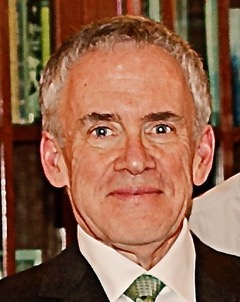It’s like a technological time warp. In the middle of the room are VCR players and Betamax machines. On the floor are boxes of tapes and video cassettes. Their magnetic imprints contain TV news programs from an age of political communication when there was no Facebook, no Twitter.
Next to a window overlooking UCLA’s sculpture garden, Tim Groeling sits in a rolling desk chair conferring with a graduate student. An associate professor of communications studies, Groeling is on sabbatical, but he also is the director of the university’s Communications Studies News Archive Digitization Project, and there is plenty of work to be done.
Groeling is 40ish, which makes him conversant with social media. Indeed, he is a leading expert in political communication and new media in the United States. He favors khaki pants, a button-down Oxford shirt and sneakers, and he looks midwestern, which he is, and boyish. Much of his archiving work is about digitizing news footage you might have seen in Southern California in the 1970s. It contains valuable information about the context of political communication and how it was presented in the news.
He and his students watch Sunday morning interview shows from nearly 50 years ago, when senators and congressmen presented their views on issues of the day. Then Groeling and the students fast-forward to evening newscasts on the same Sundays and on subsequent days to determine which parts of the interviews were selected for being newsworthy.
They are interested in how political messages from members of the House and Senate are framed. Are the messages critical of the sitting president? Does criticism from a member of the president’s party get more attention than criticism from someone in the opposing party? How much attention is paid to praise from someone in the opposing party? Is there discipline in party messaging?
Groeling’s book, “When Politicians Attack: Party Cohesion in the Media,” is based on such analysis. Published in 2010 by Cambridge University Press, it has won several awards, including the Goldsmith Book Prize from the Shorenstein Center on Media at Harvard in 2011. In the book, Groeling explores political branding, notably the messaging effort surrounding House Speaker Newt Gingrich’s “Contract with America” in 1994. Some saw similarities to the “Just Do It” campaign mounted by Nike shoes.
The book examines the difficulty a political party faces when it tries to set an agenda while it controls both Congress and the White House. When the result is party members attacking one another, he calls it a “circular firing squad.” By extension, Groeling’s book offers a glimpse into what has changed and what hasn’t during the presidency of Donald J. Trump.
Geeking up
Groeling grew up in Muncie, Indiana, the middle child in a family of three siblings. His father was an engineer in automotive plants, and his mother was an eye technician. “They thought of politics as kind of vaguely horrifying,” Groeling says, and they discouraged him from studying it.
He graduated magna cum laude from DePauw University and studied political communications at UC San Diego, where he earned his PhD. His teaching career began at UCLA, and he has never left. He started as an assistant professor in the Communications Studies Department in 2001 and has served as vice chair of the department and two terms as department chair.
Groeling says he was “geeked up” early. He served internships at the Indiana House of Representatives, the Muncie Star newspaper and on the David Letterman show on NBC, where his claim to fame was creating a computer database for Stupid Pet Tricks.
He and his wife live in Sherman Oaks. They have two daughters, one at home and the other studying statistics at UCSD.
Trump as media strategist
During an interview at the Luskin School of Public Affairs, in the corner room where he works with Betamax and the VCRs, he spoke about tweeting and the value it offers to modern presidents seeking to connect directly with their bases of political support – as well as the challenge it poses for the GOP’s traditional ways of communicating.
“Trump has the unparalleled ability to communicate directly with his core supporters without the news media filtering,” Groeling said. “At any point, any time he wants, he has the ability to influence the news agenda by what he tweets about, but also to communicate directly with his policy makers unfiltered. And that ability has been uncommon in America’s past.”
During earlier presidencies, Groeling wrote in When Politicians Attack, there was the perception “that politicians exercise some control over the news-making process by carefully choosing their words; however, if they hope to hear those words on the news, they must also anticipate and adapt to the preferences and routines of journalists, who have traditionally stood between them and their public.”
This clearly is not Trump’s approach. Does he choose his words carefully? Not particularly. At the same time, Groeling notes in his book, the mainstream media have been increasingly eroded by new media with a partisan bent.
“When I talk about Donald Trump with my students in class, I generally frame it in how presidential communication works,” Groeling said. “And Trump seems to have turned that on its head, where he is consciously controlling the media on an ongoing basis and trying to instigate controversy and outrage to get more coverage of an issue that he cares about, to change the subject in a way that he can control.”
In other administrations, Trump’s negative press and slipping polls would have been enough to send the occupant of the White House crashing to the bottom of public esteem. But that doesn’t seem to be the case with Trump, Groeling said. “People’s [positive] impression of Trump is less vulnerable to change from a single piece of additional information than almost any politician before him, because he had been in not only entertainment and in the public consciousness for decades, but the media during that time period helped him foster his positive image.”
There has been too little attention paid, Groeling said, to how Trump’s rise to power “has fundamentally changed the brand of the Republican Party.
“The Republicans were once the party of free trade. The Democrats were the party of protectionism. The Republicans were, at least for a period of time, the party of the educated elite. The Democrats were the party of the working class. These sort of cultural divisions and sometimes issue packages have changed very dramatically in a short time, in a way that is quite frankly surprising.”
Some Republicans have resisted this, but Trump has seemed somewhat impervious to party criticism. Republicans, Groeling believes, are wary of the damaging power of his twitter feed. Indeed, Groeling has been surprised at how ineffective criticism of Trump has been within his own party.
Partly, he said, it has been because of coverage. “Every time (former House Speaker Paul Ryan) would say something that was like ‘Trump has said this, we can’t do this,’ it would generate a lot of coverage. But if Ryan would say, ‘Here’s what I want to do in Congress,’ nobody did any coverage of that. And Ryan seemed pretty relieved to be done with Congress. Basically, that was a poisoned chalice for him.”
Democrats may be encountering their own messaging issues, Groeling said. He cited the release of information about Green New Deal economic stimulus programs by New York Congresswoman Alexandria Ocasio-Cortez, along with Massachusetts Sen. Edward J. Markey. “How did this plan get out without the central party boosting it?” Groeling asked. “And what are they going to do now?
“My impression is that it’s been talked about a lot more by critics than supporters. It’s been this sort of thing that might define the Democratic Party in a way that makes it hard for them to win in 2020.”
Groeling noted Senate Majority Leader Mitch McConnell’s willingness to bring the Green New Deal up for a vote: “It’s smart for him to get people on the record on this because its release was sloppy and seat-of-the-pants.”
The Green New Deal rollout may be an indicator of bigger battles ahead between Ocasio-Cortez and the party leadership, Groeling said.
He wonders if her move might have been an attempt to seize agenda control.
Trump, he said, has his own way of agenda control.
“He says this really extreme thing, that’s 15 miles from what he wants. People get outraged, and then he eventually gives in to something that is closer to what he wants. He’s happy, and everyone seems to be happy with their anger in that situation. It seems to work out pretty well.”
Trump’s messaging style will hold his base, Groeling said.
“He seems to be, for better or ill, relatively authentic in terms of saying or tweeting whatever is at the top of his head and not running it through a lot of people to make it more pleasant.
“So that might actually, I think, feed into his believers viewing him as authentic or viewing him as being more trustworthy than people criticizing him.”
Is Groeling surprised by how his career – from stupid pet tricks to analyzing congressional communications – has turned out?
“I used to have arguments when I was in grad school with people who studied Congress,” he said. “They didn’t want to study Congressional communications at all. They were like ‘Why would you study that? It’s cheap talk.’
“That’s actually one of the things that inspired me to write my book. It’s not all equally cheap. That insult actually inspired my career.”

























